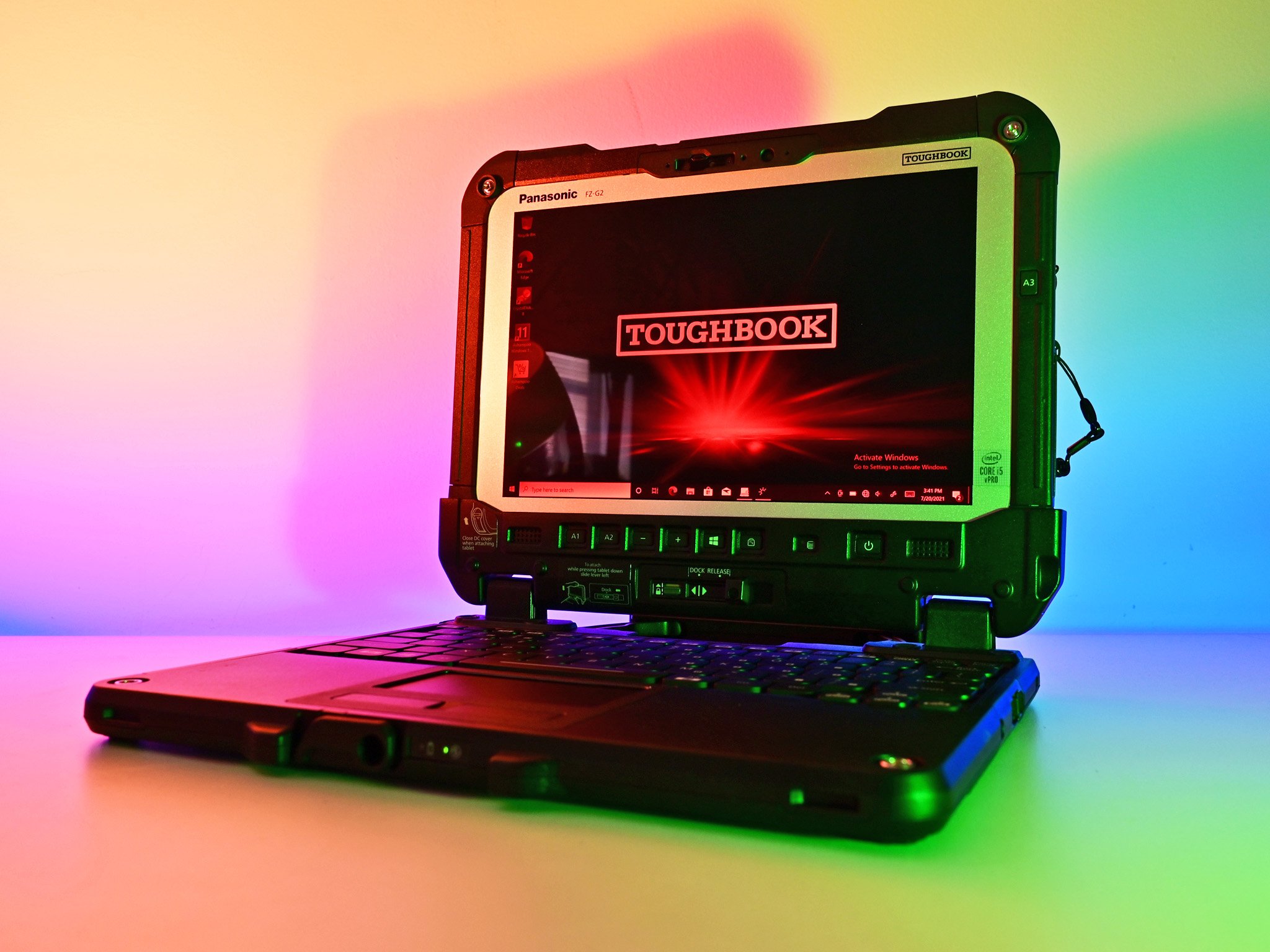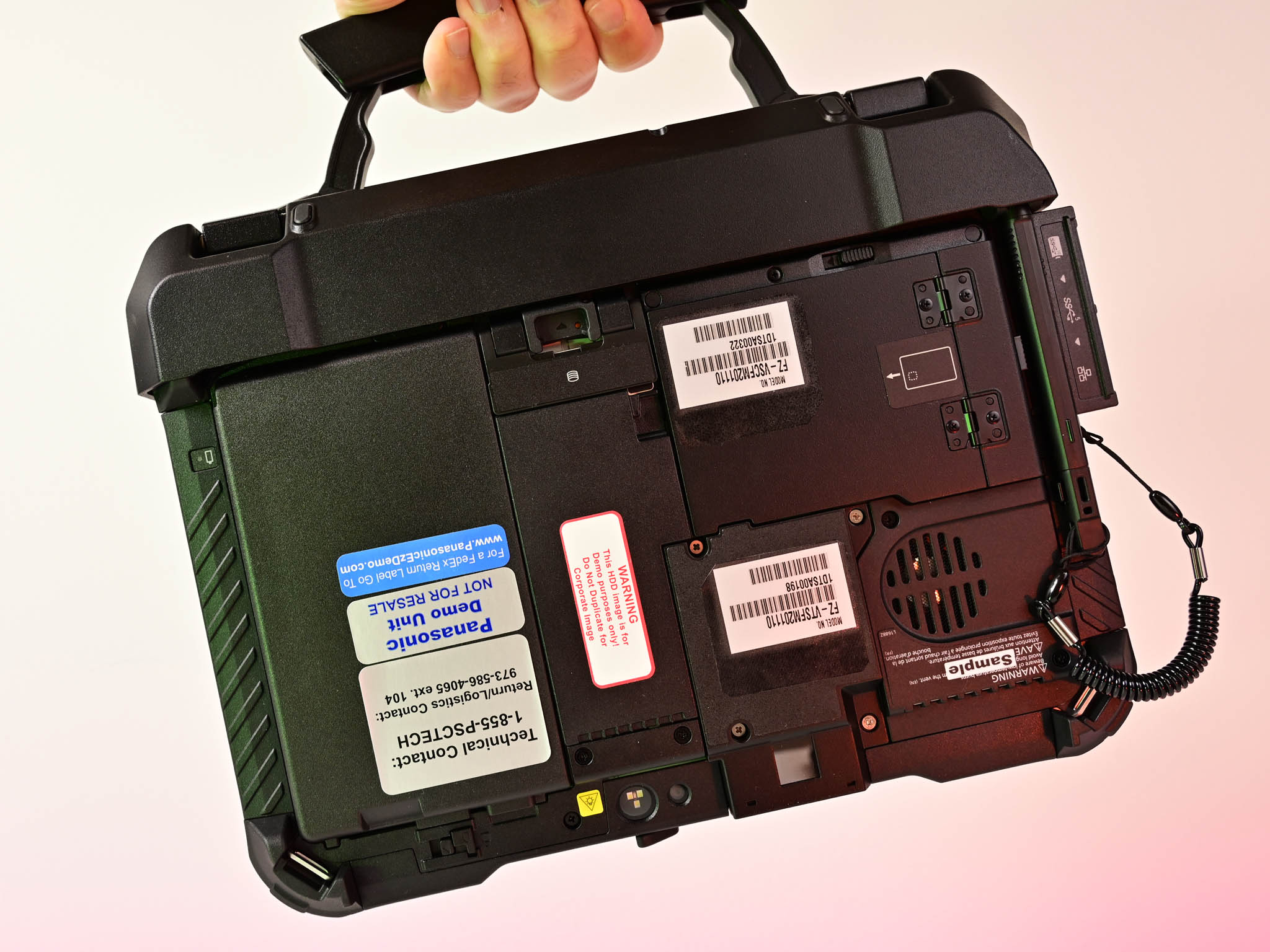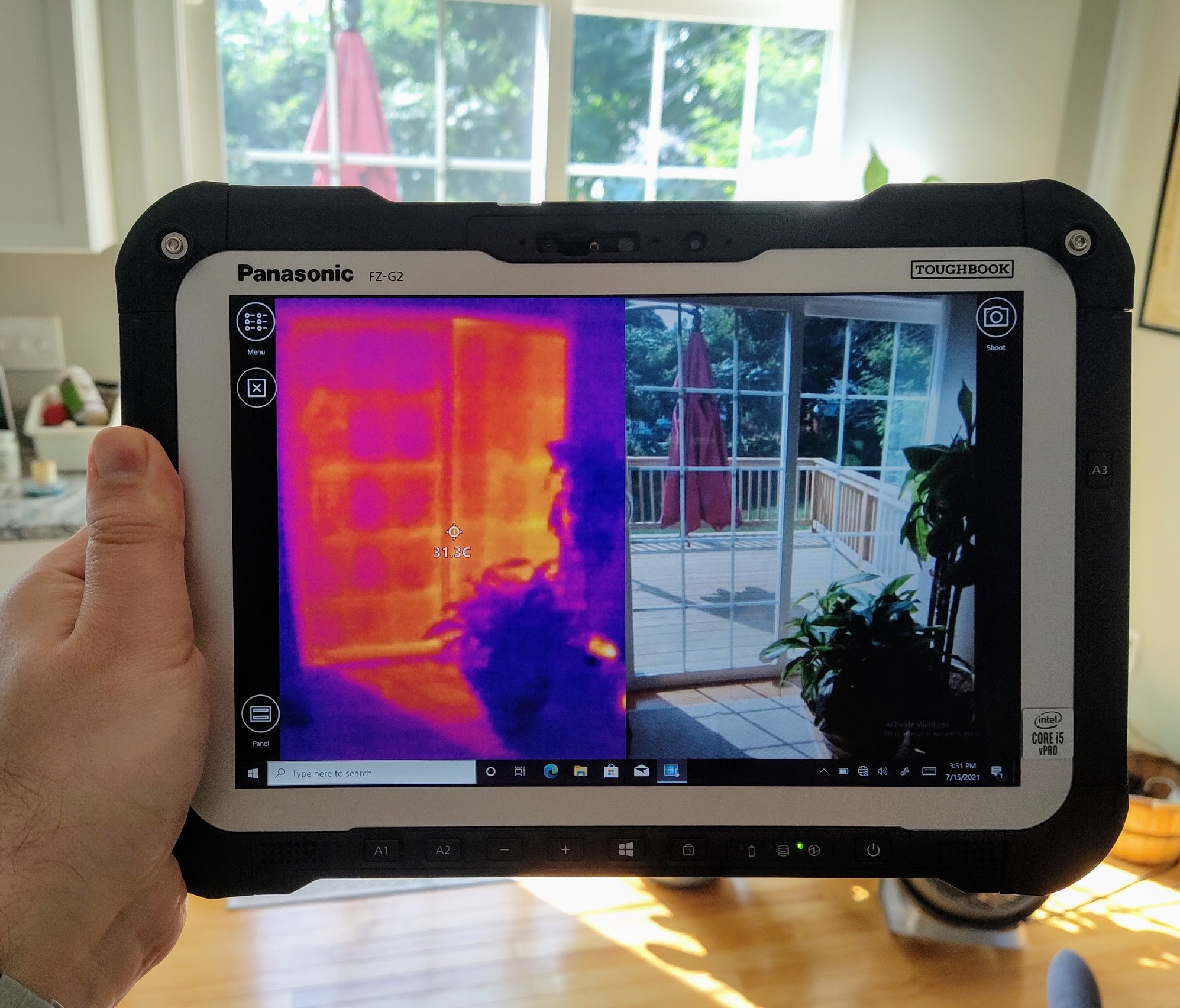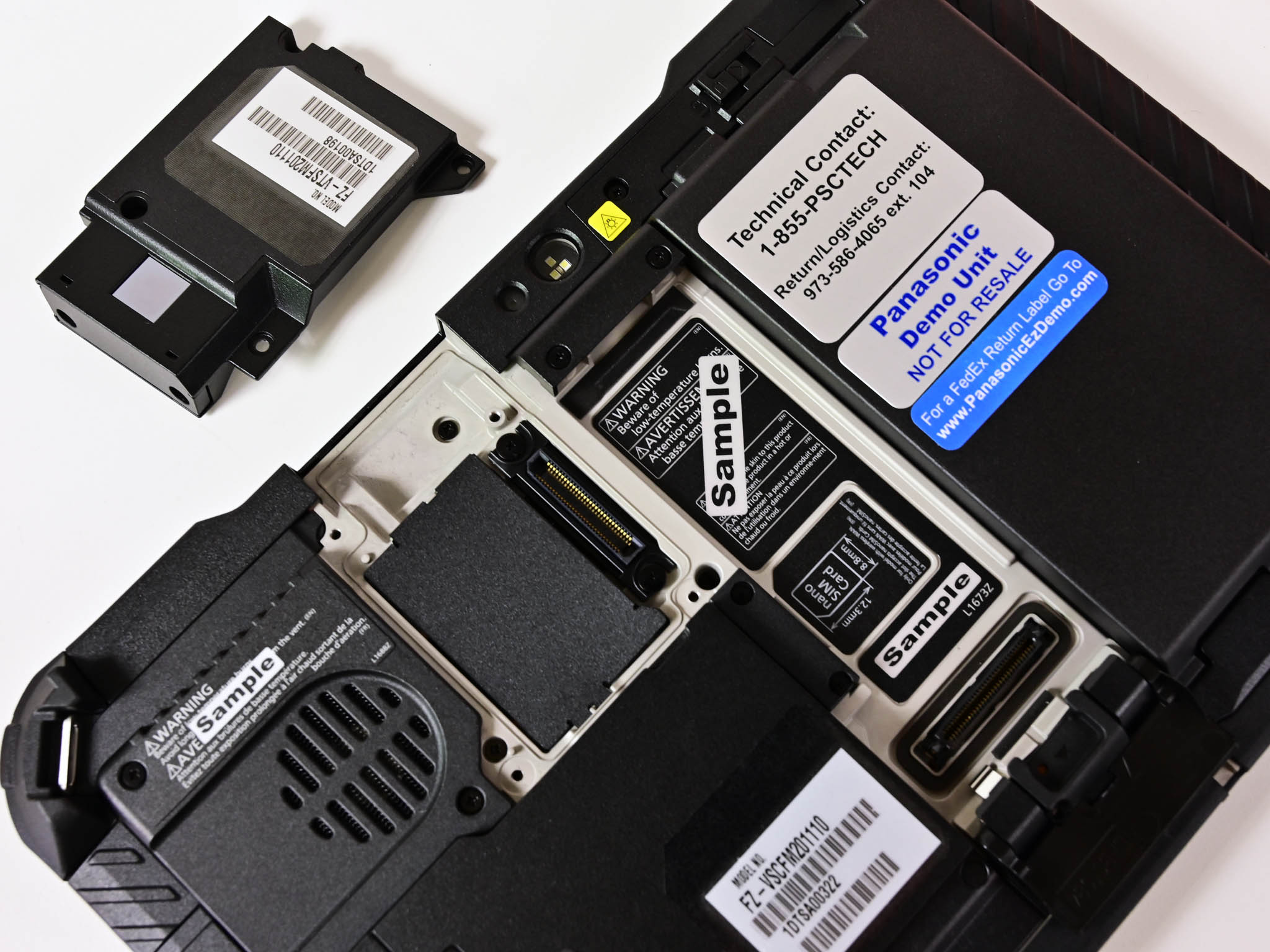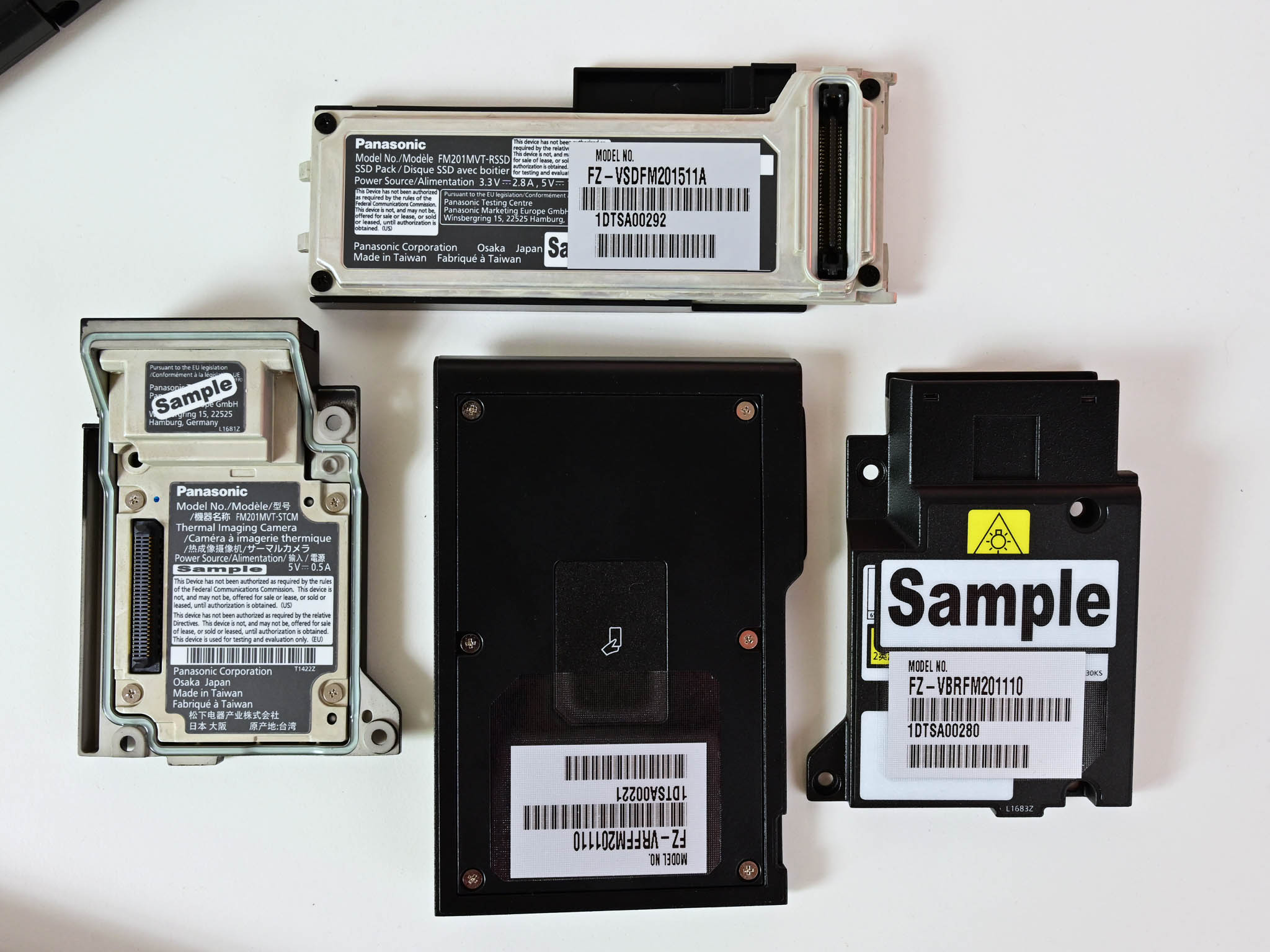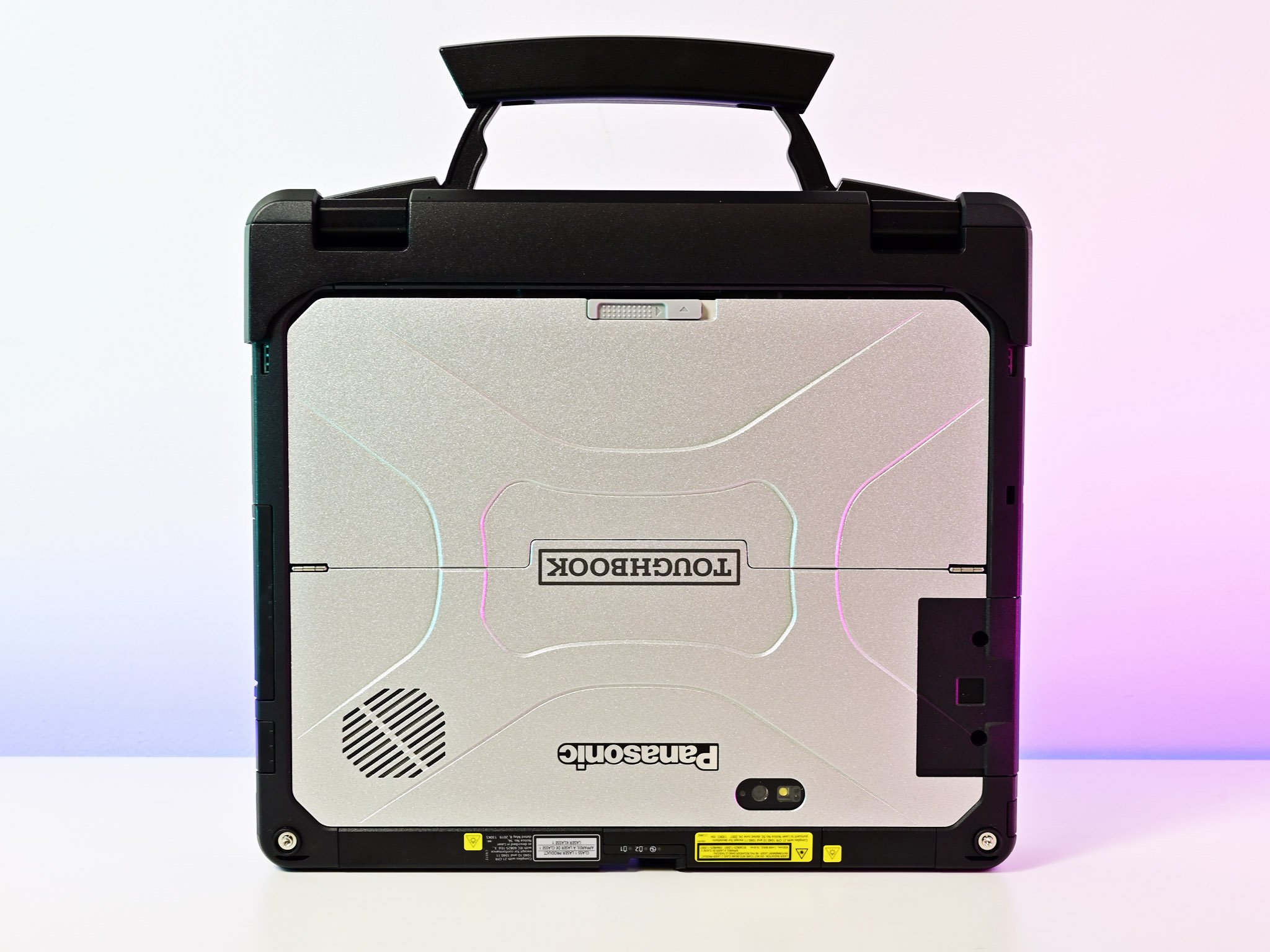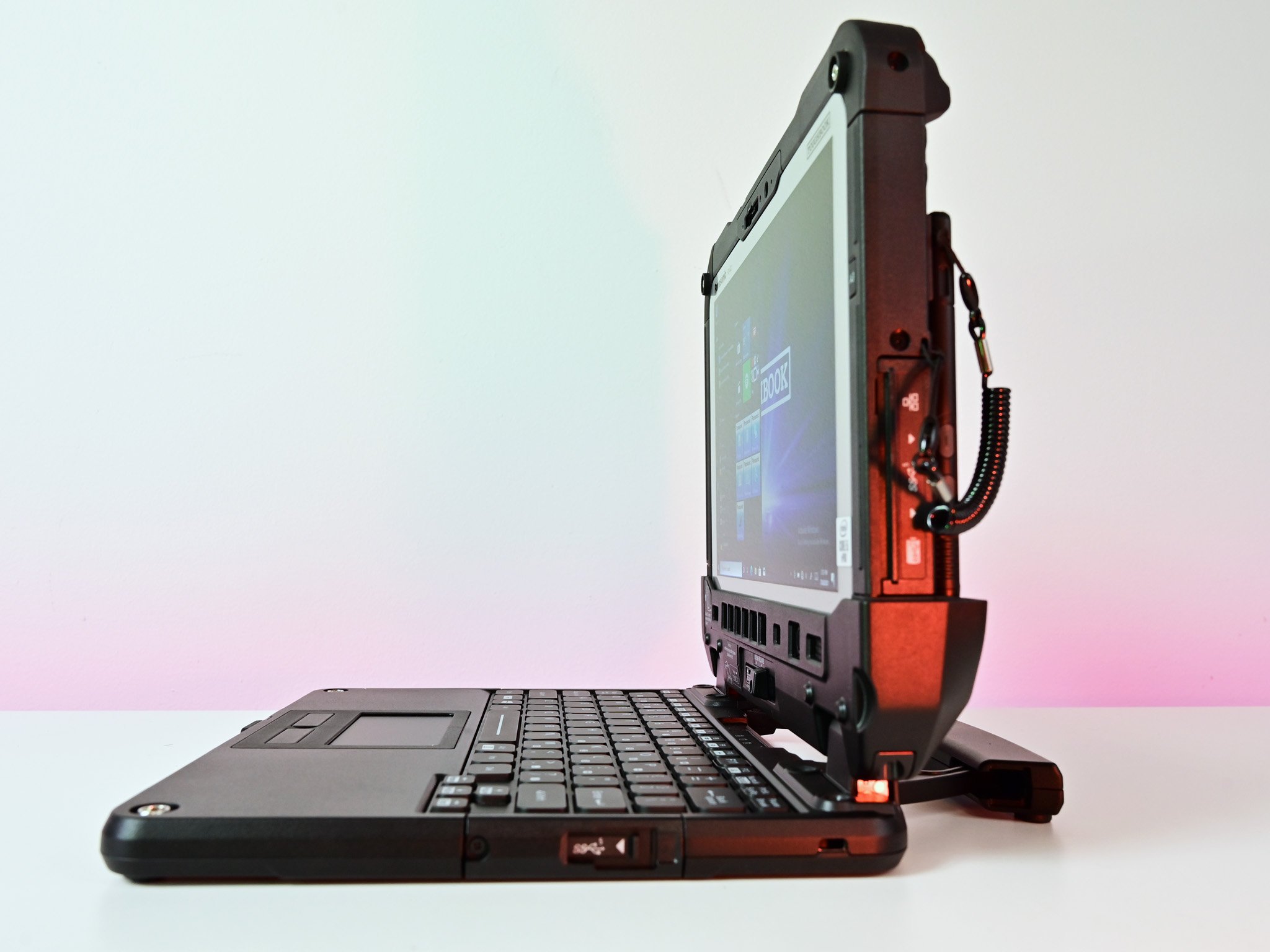Panasonic is on a kick with its famous Toughbook line of hardcore PCs (and Android tablets). We recently reviewed the Toughbook 33 and Toughbook A3, along with the flagship Toughbook 55 still available with LTE.
Just announced is the new Toughbook G2, which combines past products Toughbook G1 (tablet) and Toughbook 20 (laptop) into one killer device. It also borrows from the Toughbook 55's modular ability, but instead of just one modular bay, this device has three, even though it is much smaller.
I spent the last week with the Toughbook G2. Imagine taking Microsoft Surface Go, adding a keyboard, and making it wholly modular and tough as nails. It should be the perfect PC for utility, field services, military, fire, EMS, police, and anyone else working where conditions are harsh. Toss in 4G LTE, GPS, and a thermal camera, and you have the most extreme PC of 2021.
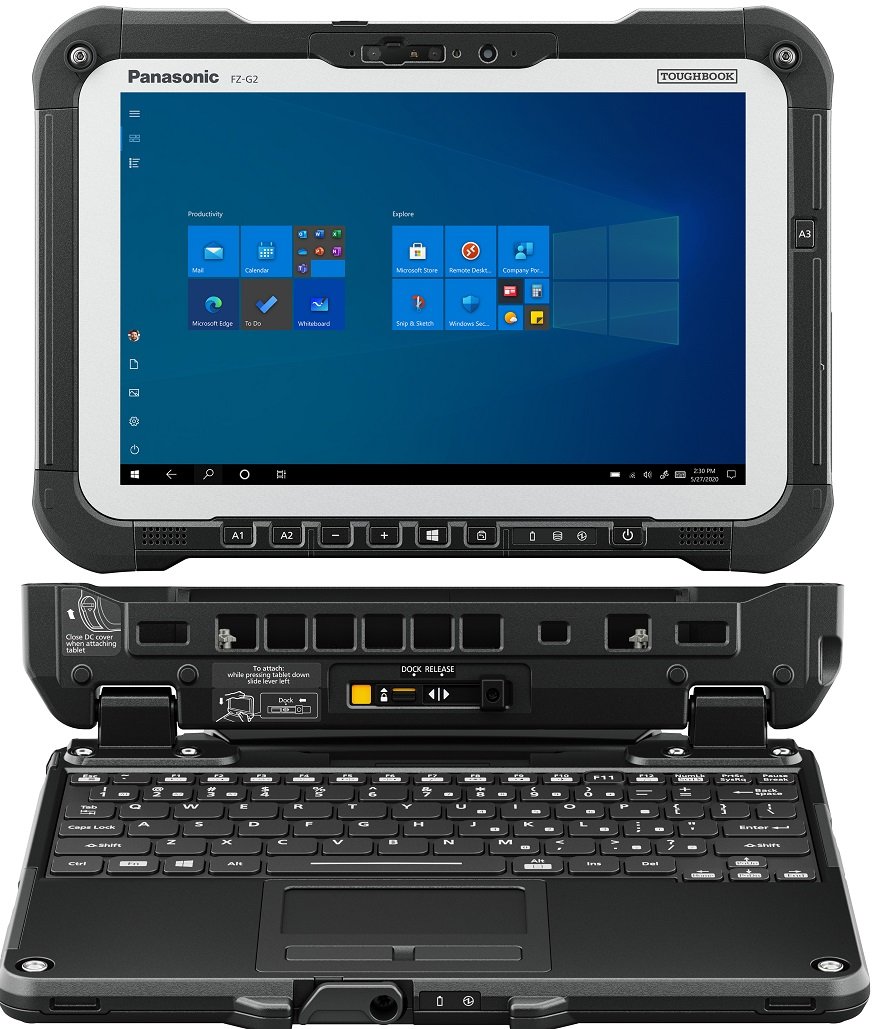
Bottom line: Panasonic's G2 is the perfect rugged tablet PC with an optional keyboard that is also completely adaptable to whatever job it is tasked with, thanks to its tri-modular design.
Pros
- 3 modular bays including removable SSD
- Optional 4G LTE (dual SIM)
- Excellent display
- Loud speakers
- Good performance, excellent battery life
Cons
- Trackpad is terrible
Panasonic Toughbook G2: Price and availability
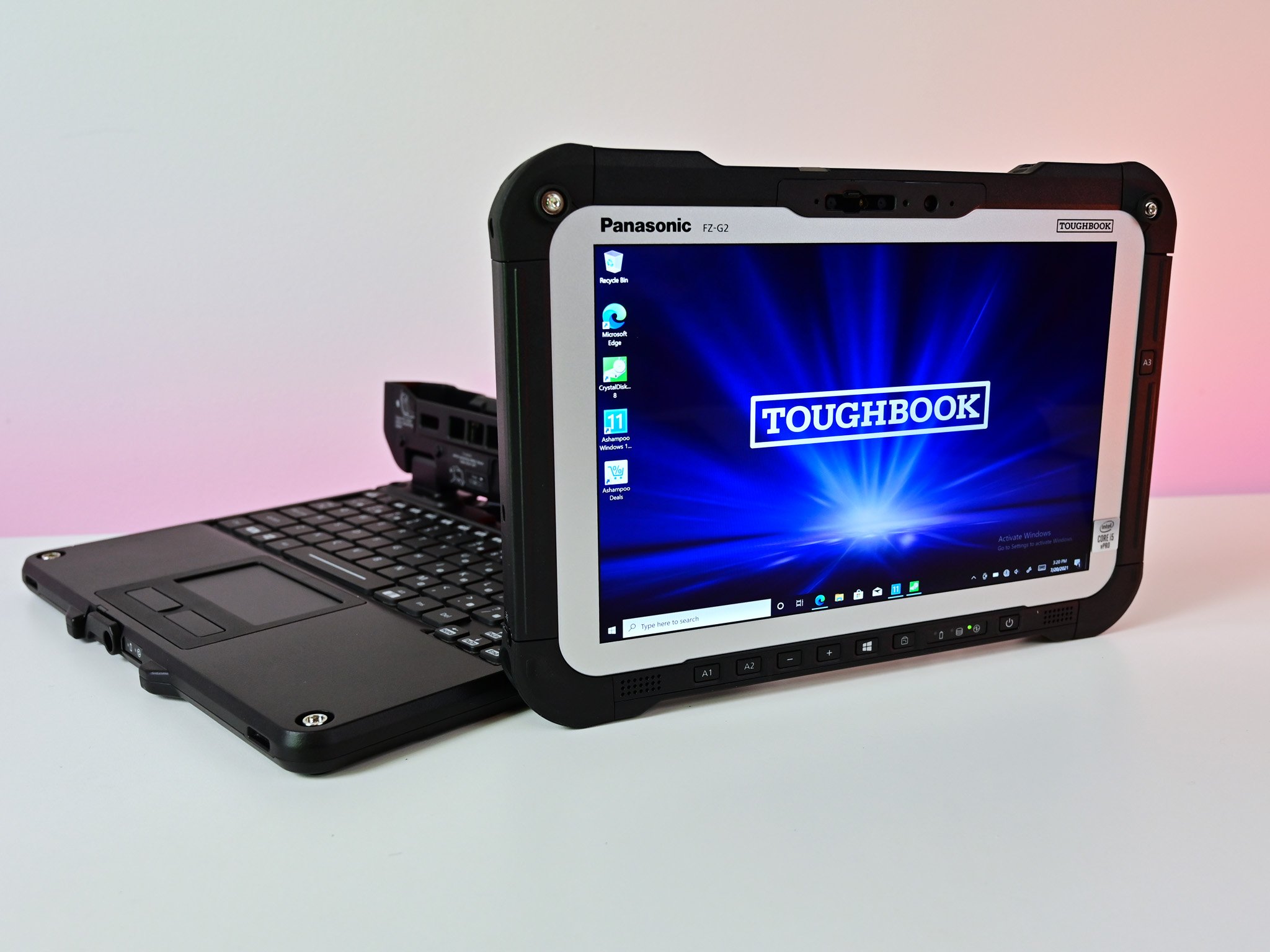
The Panasonic Toughbook G2 is now available direct through Panasonic. The starting price is $2,999 and varies significantly due to the number of configuration options.
Businesses or governments can buy just the tablet portion or add in the keyboard to complete the PC experience. There are also ten optional xPAKs (Panasonic's proprietary expandable bays), including Thermal Camera, 2nd LAN, Barcode Reader, Contactless SmartCard, and OPAL SSDs. Integrated options include 4G LTE and dedicated GPS in addition to those xPAKs.
Panasonic Toughbook G2: What you'll like
The Panasonic Toughbook G2 is a surprisingly compact but powerful tablet and laptop combo. It is like the Toughbook 33 (12.0-inches) but features Panasonics xPAK modular design. This modularity is necessary for businesses, EMS, or the military where the mission may change. Previously, customers would send back the device to Panasonic to retrofit, but now, customers with a screwdriver can do it in 90 seconds.
Our review unit used the Core i5-10310U, 16GB of RAM, and a 512GB SSD. Customers can upgrade to a Core i7, 32GB of RAM, and a 1TB SSD. Performance was decent for the Core i5, especially when set to performance mode – there were no lags or stutters. The OPAL NVMe SSD is also decent, with 2,400 MB/s sequential read and 1,500 MB/s for write.
All the latest news, reviews, and guides for Windows and Xbox diehards.
The display can hit an astounding 1,000 nits of brightness, which, when combined with the anti-reflective layer, makes it ideal for outdoor use as you would expect. The display supports touch, and there is a built-in pen for notetaking or marking up documents.
There are other modern-day PC features, too, like Windows Hello infrared for effortless logins to Windows 10 and a privacy shutter. Not only can you get 4G LTE, but there is support for both Nano-SIM and the increasingly crucial eSIM technology.
| Category | Panasonic Toughbook G2 |
|---|---|
| Operating System | Windows 10 |
| Display | 10.1-inch 1920 x 1200 (WUXGA) Capacitive touch, digitizer Direct bonding Anti-reflective Day/Night/Concealed modes |
| Processor | Intel Core i5-10310U vPro Intel Core i7-10810U vPro |
| Graphics | Intel UHD |
| Memory | 16 or 32GB DDR4 |
| Storage | 512GB or 1TB Quick-release OPAL NVMe SSD with heater |
| Rear Camera | 8MP with autofocus, LED flash Optional thermal camera (FLIR Lepton 3.5) |
| Front Camera | 1080p with privacy shutter Dual array mic |
| Security | Infrared with Windows Hello Secured-core PC TPM 2.0 NEST BIOS compliant Kensington cable lock (x2) Optional SmartCard reader Optional contactless SmartCard reader |
| Connectivity | Wi-Fi 6 Bluetooth 5.1 Optional 4G LTE-A (FirstNet) Dual-SIM (Nano, eSIM) CBRS Band 48 compatible Optional dedicated GPS (u-blox NEO M8N) |
| Ports | Tablet: Type-C w/PD, Type-A, Ethernet, USB-A (2nd, optional) Keyboard: Docking connector 24-pin, Type-C, Type-A |
| Audio | 88db speakers (front-facing) |
| Battery | 6300 mAh Up to 18.5 hours Optional bridge battery |
| Water Resistance | IP65 MIL-STD 461G MIL-STD 810H |
| Dimensions | 11.0" x 7.4" x 1.1" (tablet only) |
| Weight | 2.9lbs (4.9lbs with optional keyboard) |
The front-facing speakers crank to a very loud 88 dB, allowing you to hear the PC's audio whether pulled over on the highway (police), in an ambulance, or any work environment with a lot of noise.
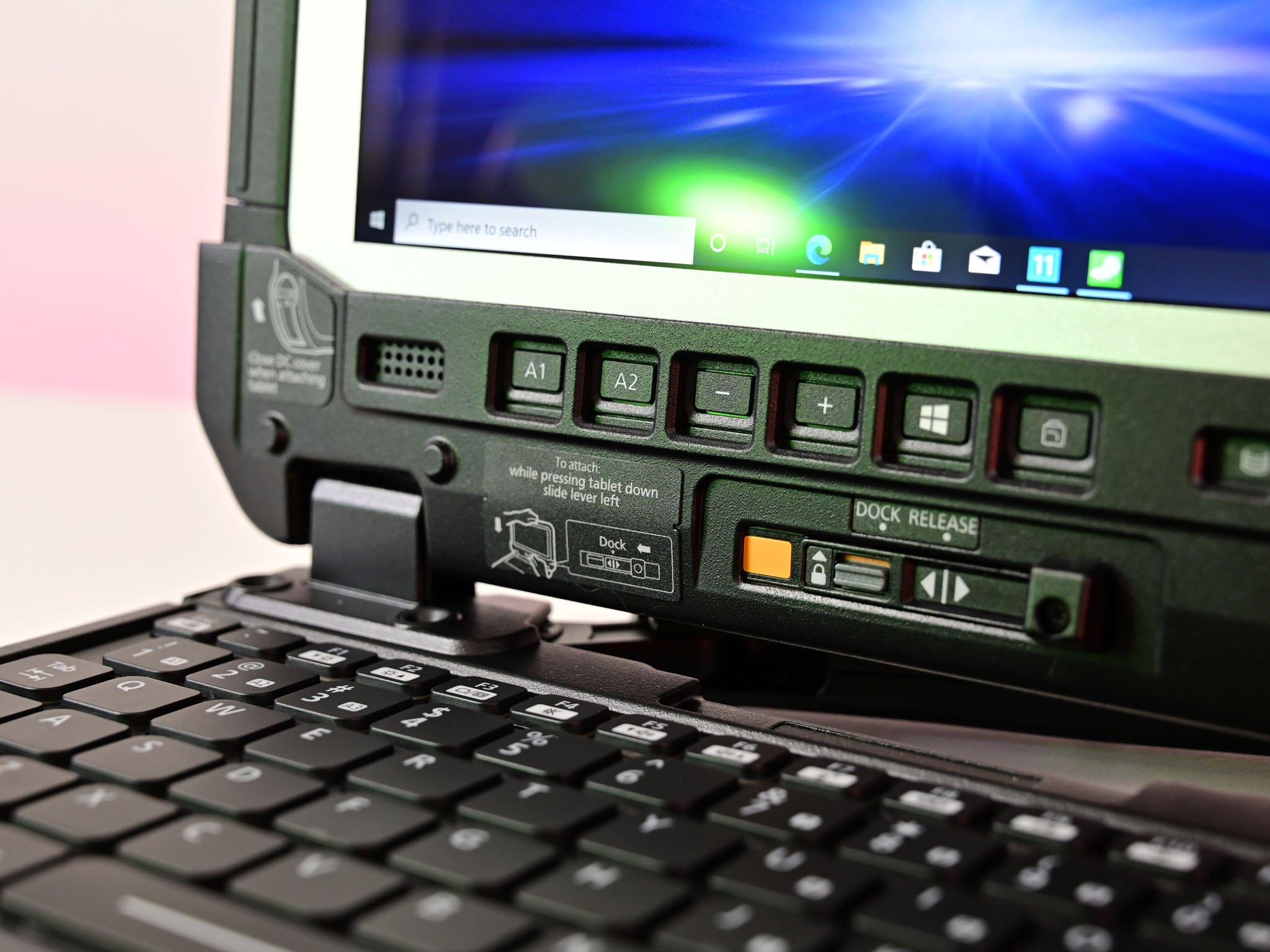
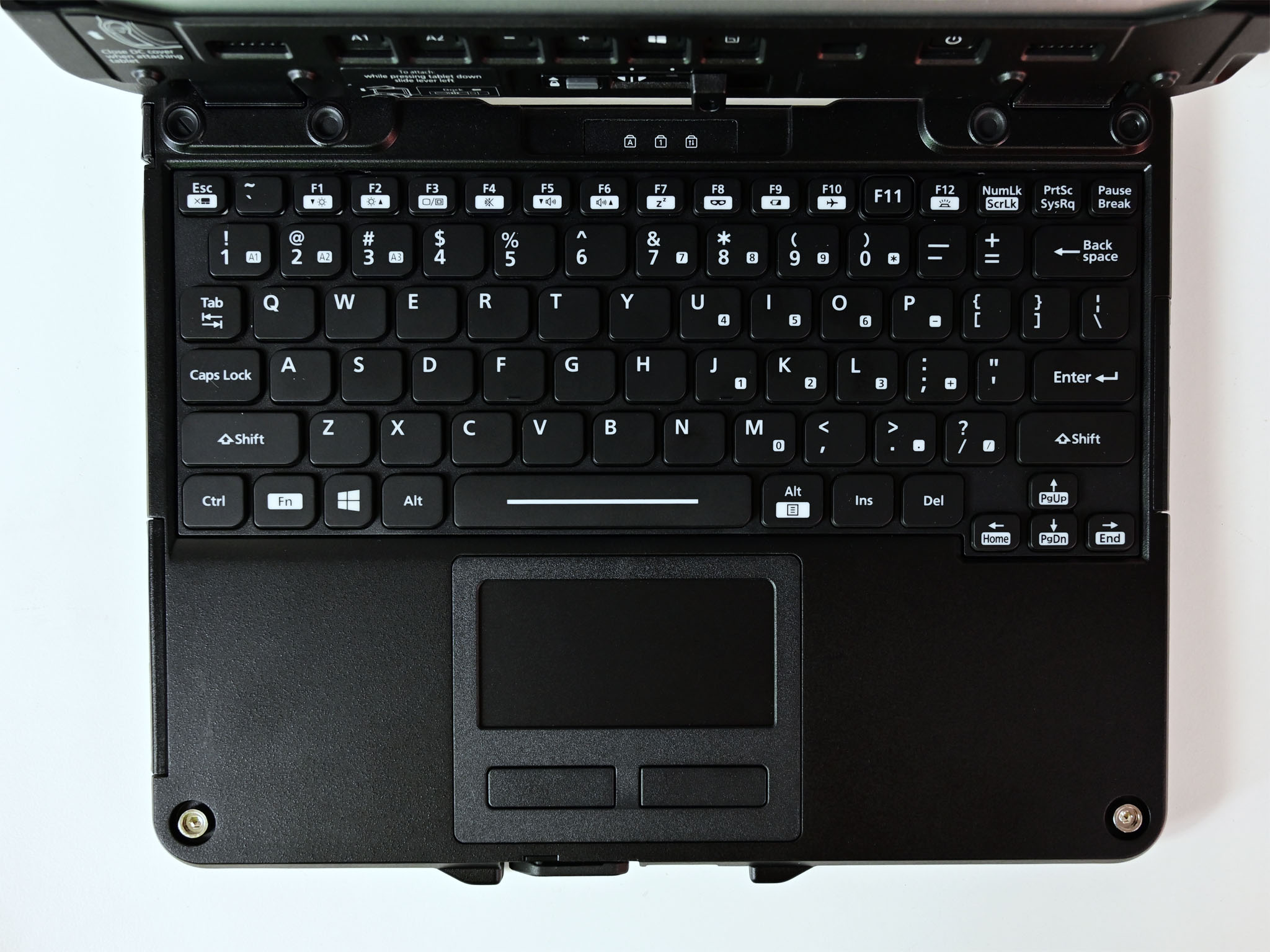
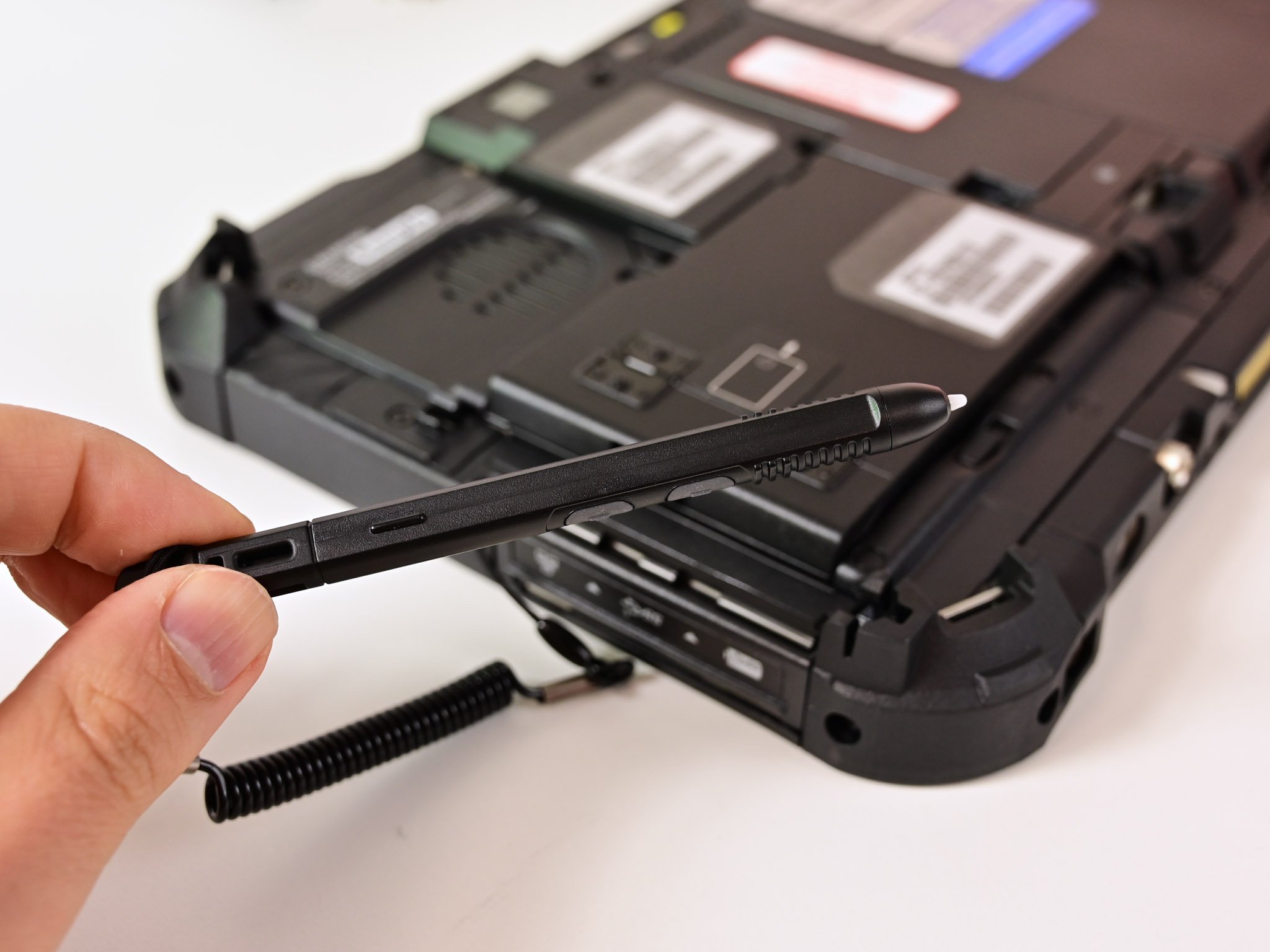
The optional keyboard is also backlit and nice to type on, thanks to the ample key travel. The tablet PC simply slots into the keyboard and locks into place with a lever mechanism. On the front of the tablet are a few user-programmable buttons for quick launching any software one uses frequently.
But really, it's the modular bays – all three of them – that are the stars here. A company can remove a barcode reader with those bays and replace it with a FLIR thermal camera or add some extra ports. Another area is configured for either insertable or contactless SmartCards. Another bay is for the SSD, letting government organizations remove sensitive storage with just a few motions.
Replacing the extra RJ-45 port with a FLIR camera and firing up Panasonic's special software is a real treat. Whether it is spotting burning brush in the field or utility workers looking for electric "hot spots," the FLIR camera lets you take half an image in thermal and the other half as a real photo making it perfect for documentation and record-keeping.
With the ability for customers to hot-swap batteries, add in new hardware, secure SSDs, and more, the Panasonic Toughbook G2 is quite a robust device that should last years. That's also thanks to the IP-65 water resistance and MIL-STD ratings, making this tablet/laptop combo nearly indestructible.
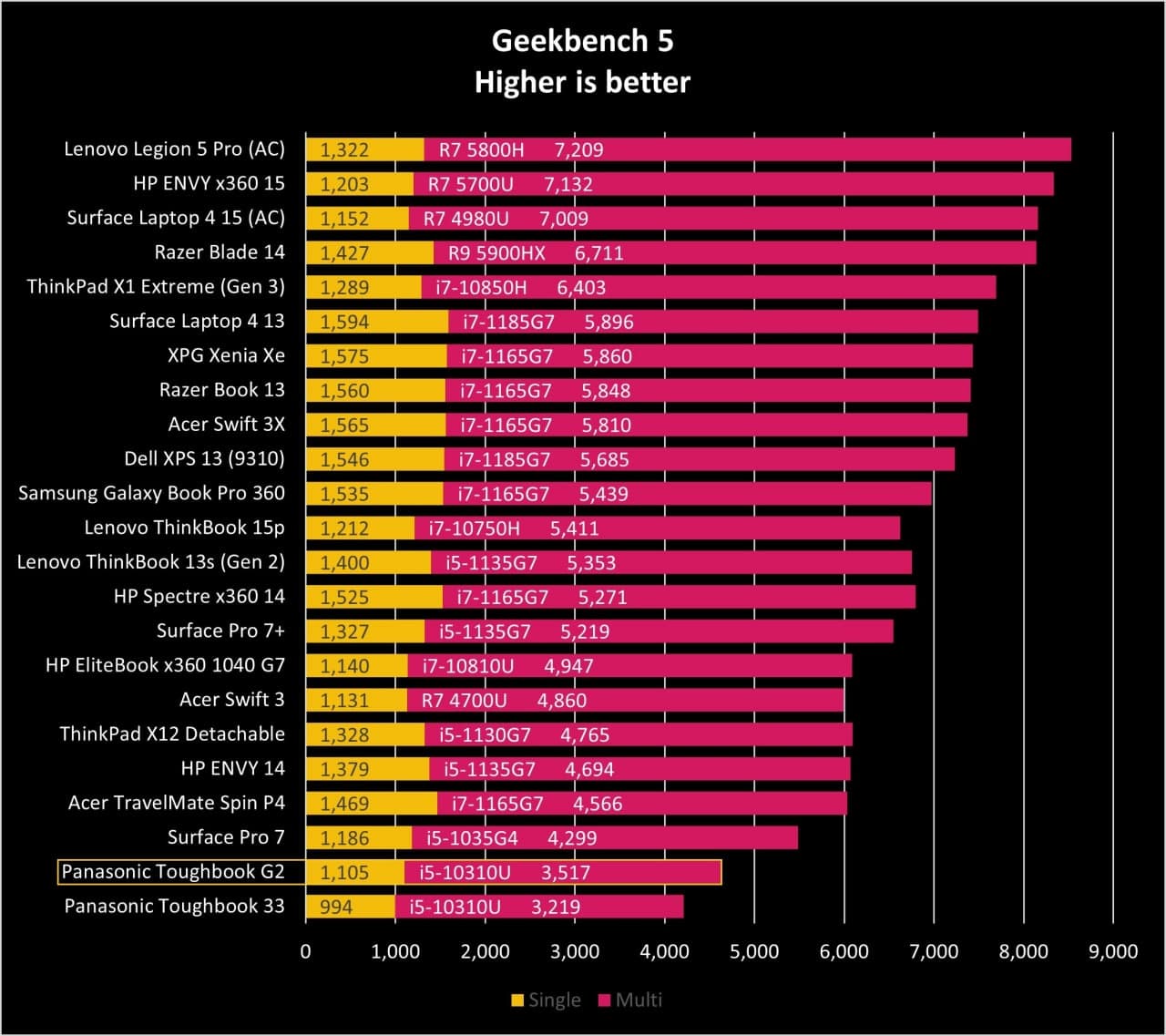
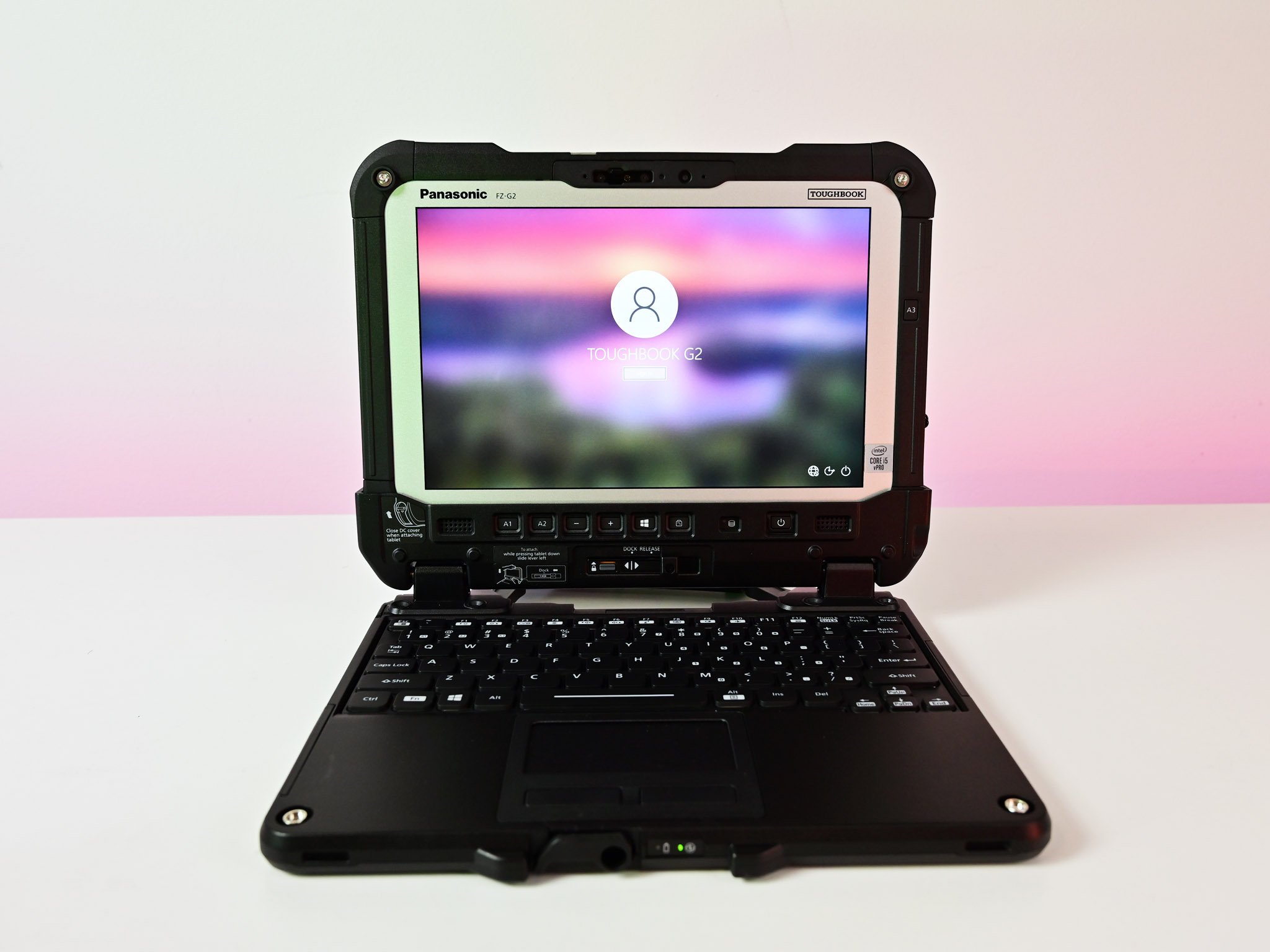
And for easy carrying, there is a built-in expandable handle grip that doubles as a stabilizer for the keyboard when typing.
Finally, for those wondering, yes, Panasonic says this rugged tablet PC will get Windows 11 and qualifies for the upgrade. Panasonic will work with customers who want the updated OS or for those wishing to stay on Windows 10.
Panasonic Toughbook G2: What you won't like
There's not a whole lot to complain about when it comes to the Panasonic Toughbook G2, except one thing: the trackpad. It is tiny and lacks accuracy making it frustrating to use.
Lacking Microsoft Precision drivers, the non-clicking touchpad is so bad I just ended up using the touch screen most of the time. I had a similar complaint on the Toughbook 33 (though the Toughbook 55 does use Precision and is quite lovely).
To be fair, Panasonic's challenge is more about durability than usability. Moving touchpads are a no-go due to ingresses and how easy they can break in the field. That said, I would love for Panasonic to get on board with haptic trackpads, which solve all of these problems.
Panasonic Toughbook G2: Competition
There's not much direct competition with the Panasonic Toughbook G2 besides Panasonic's own offerings.
Dell does offer the Latitude 7220 with an 11.6-inch display. However, it is still on Intel's older 8th Gen CPU, uses slower DDR3 RAM, and has no modularity. It also feels like Dell is slowly backing out of rugged devices due to Panasonic's strong presence.
The Panasonic Toughbook 33 is similar in overall design to the G2 but has a larger display at 12.0-inches and doesn't have any modular components besides hot-swappable batteries.
Some may not need Toughbook's G2 primary function, which is a tablet PC with inking. For those who prefer a more traditional laptop (also with inking) but with similar features, the Panasonic CF-55 is an incredible laptop that is also modular but with one bay instead of three. I used this laptop myself – even hiking 4,000 to a top of a mountain where the 4G LTE worked without a hitch.
Panasonic Toughbook G2: Should you buy it?
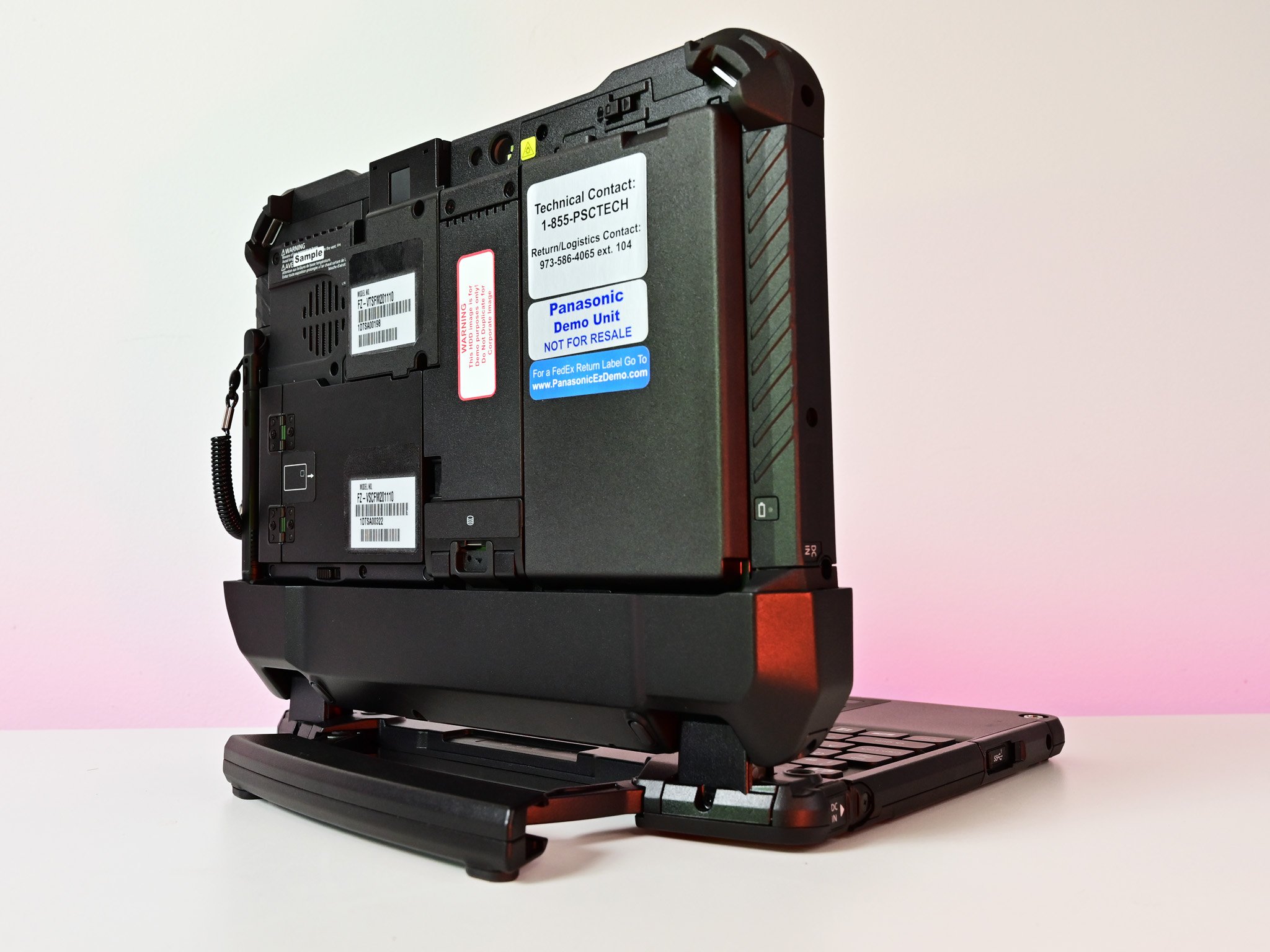
You should buy this if ...
- You need a tough, compact, rugged Windows tablet PC
- You're in the military, EMS, utility, or do contract work in the field
- You want a modular, flexible PC with 4G LTE
- You're a "prepper" waiting for the 2024 election
You shouldn't buy this if...
- You work in the office
- You game
- You don't know what CSAR stands for
The Panasonic Toughbook G2 brings all that is unique about Toughbooks into one fascinating PC. While most "civs" won't ever need to touch this device, it is still fun to think about how your police, fire, EMS, military, or even electric utility company will be using this device to serve the community or succeed in missions.
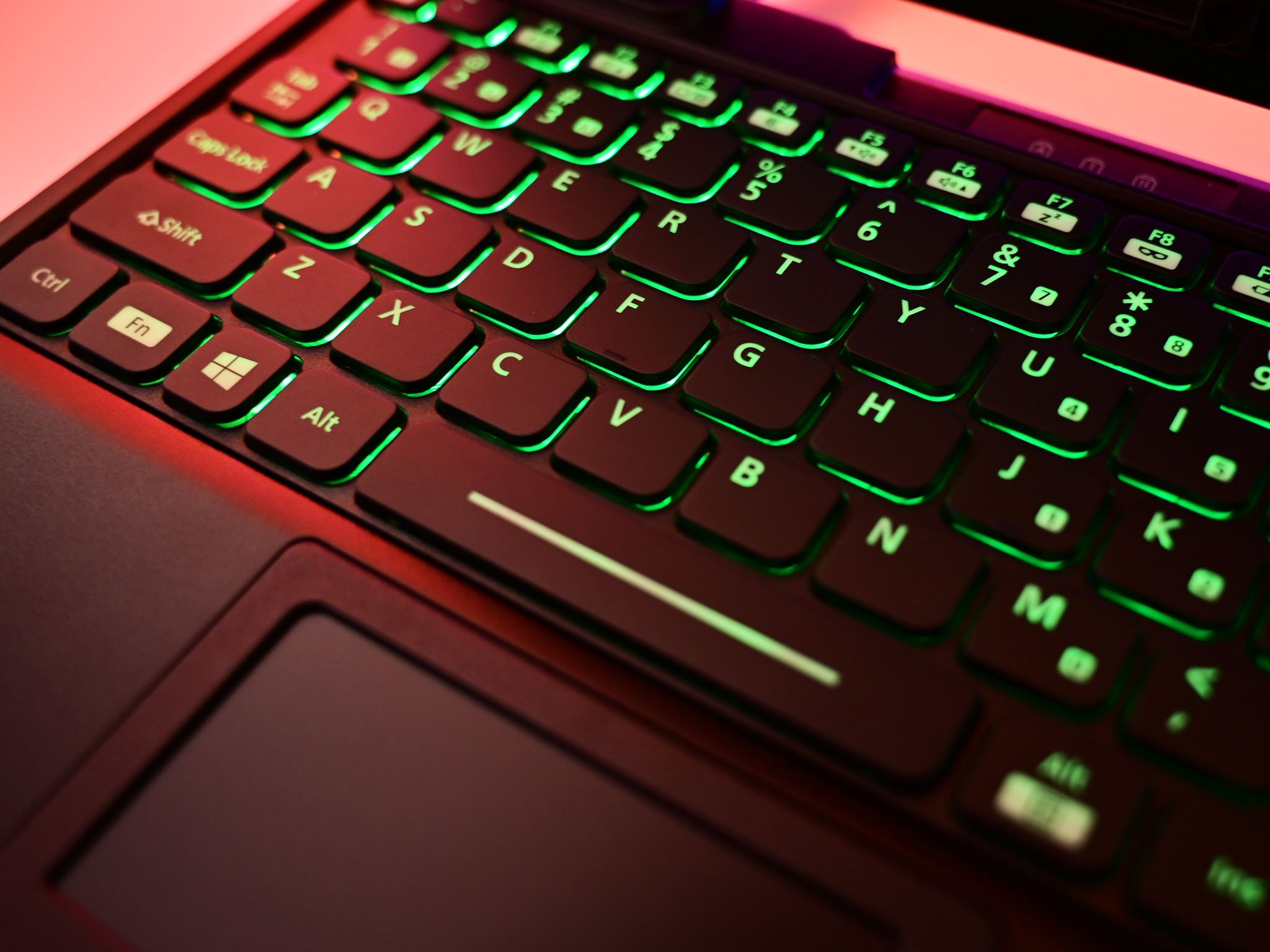
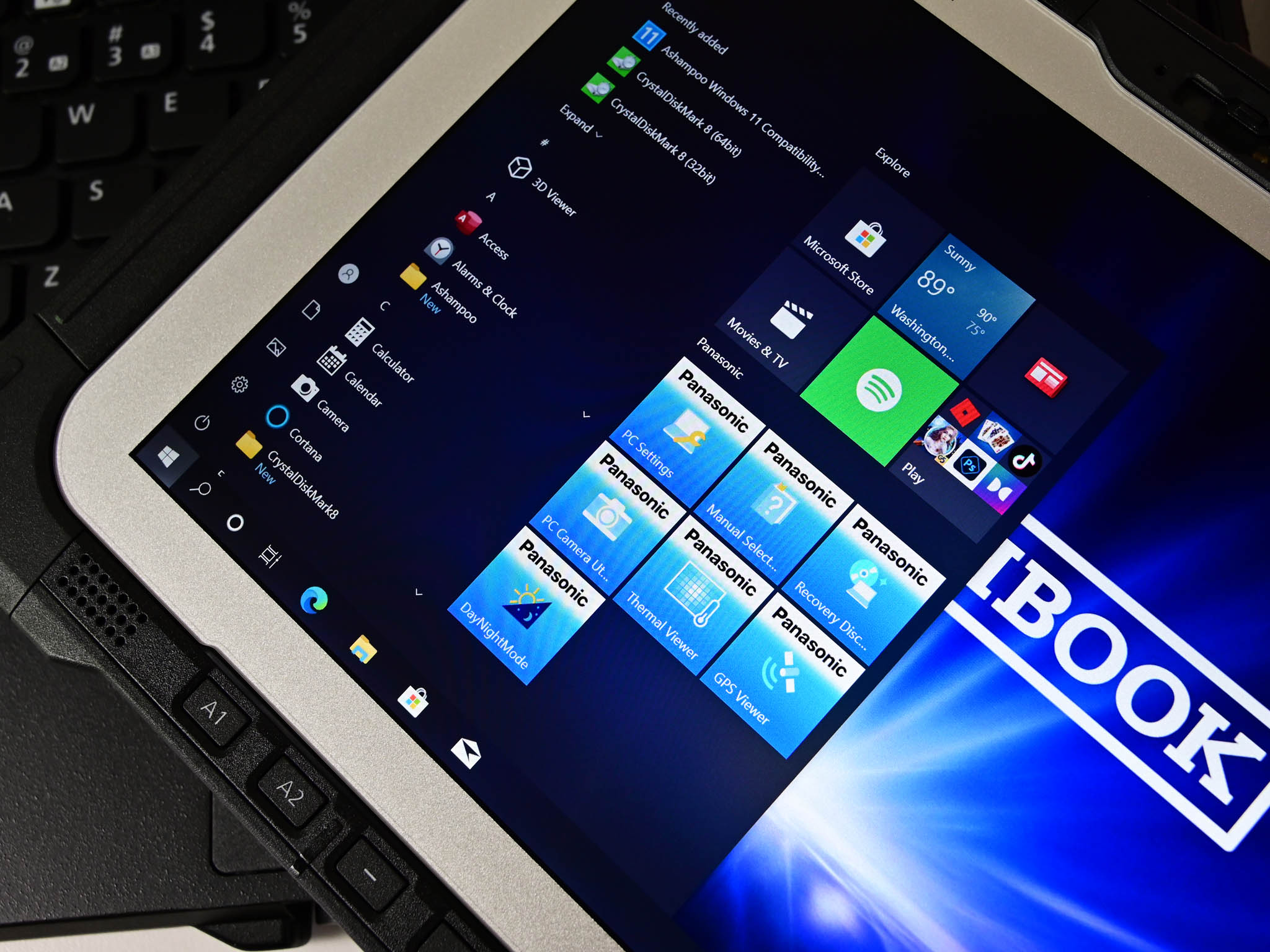
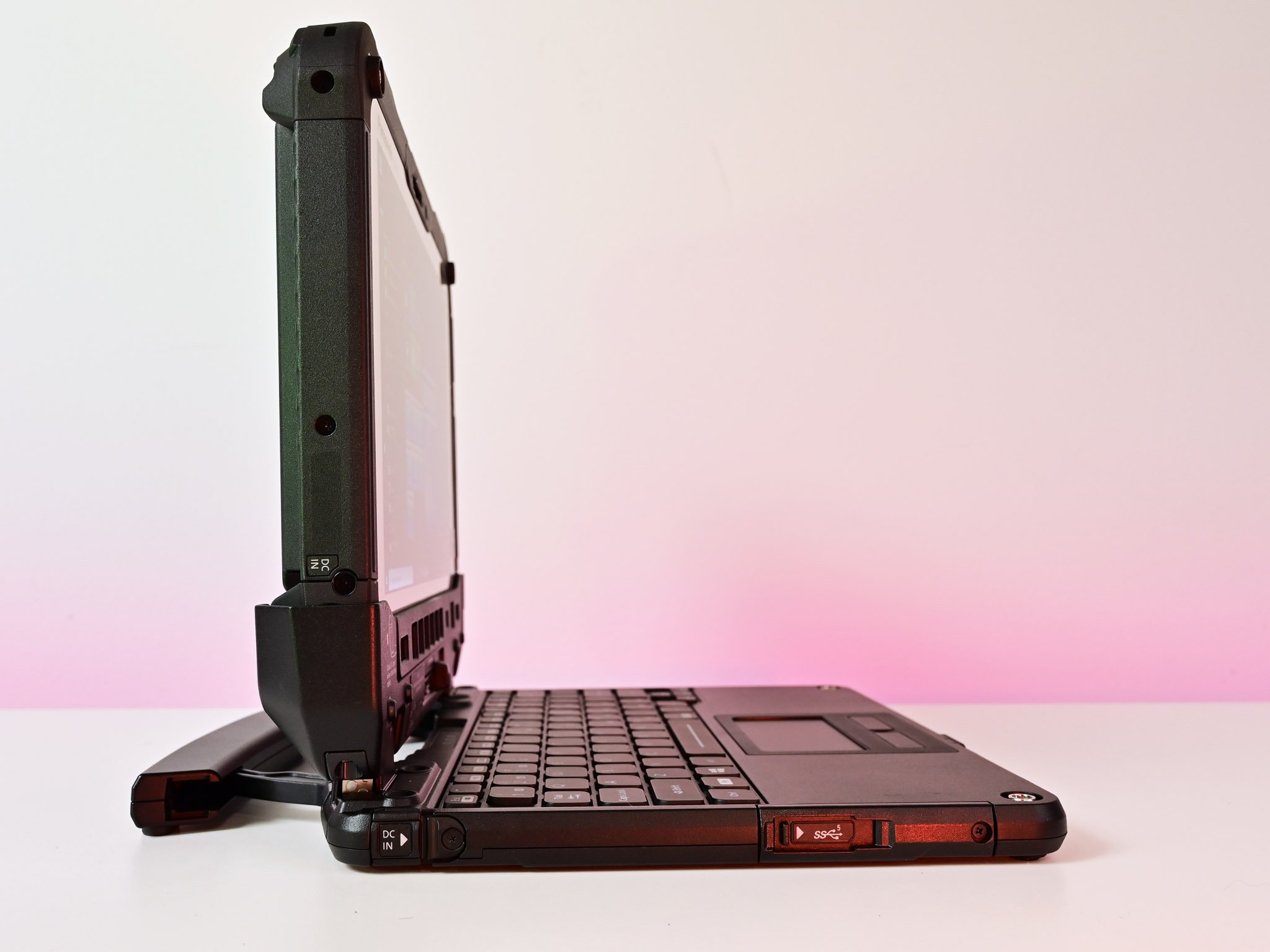
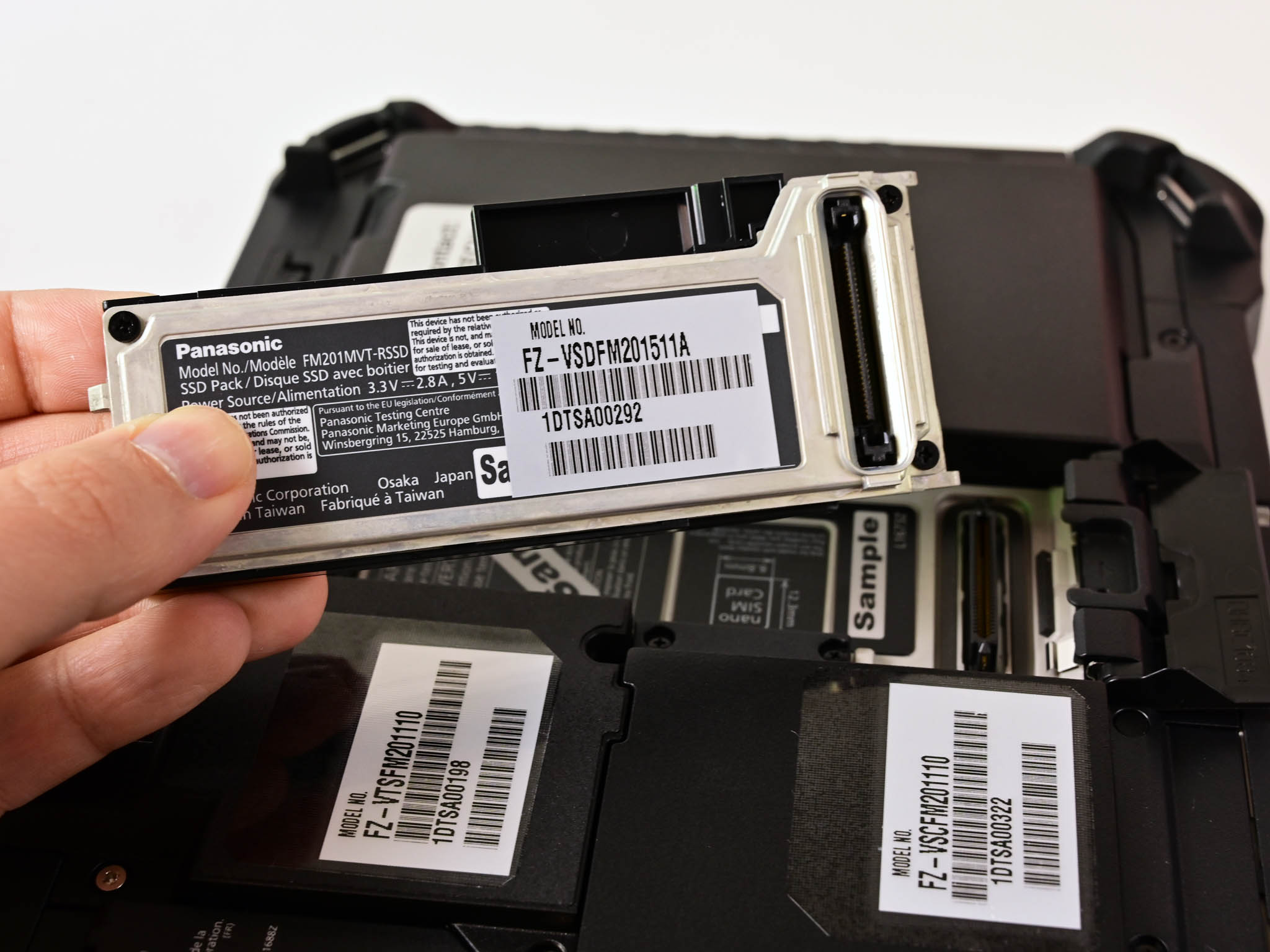
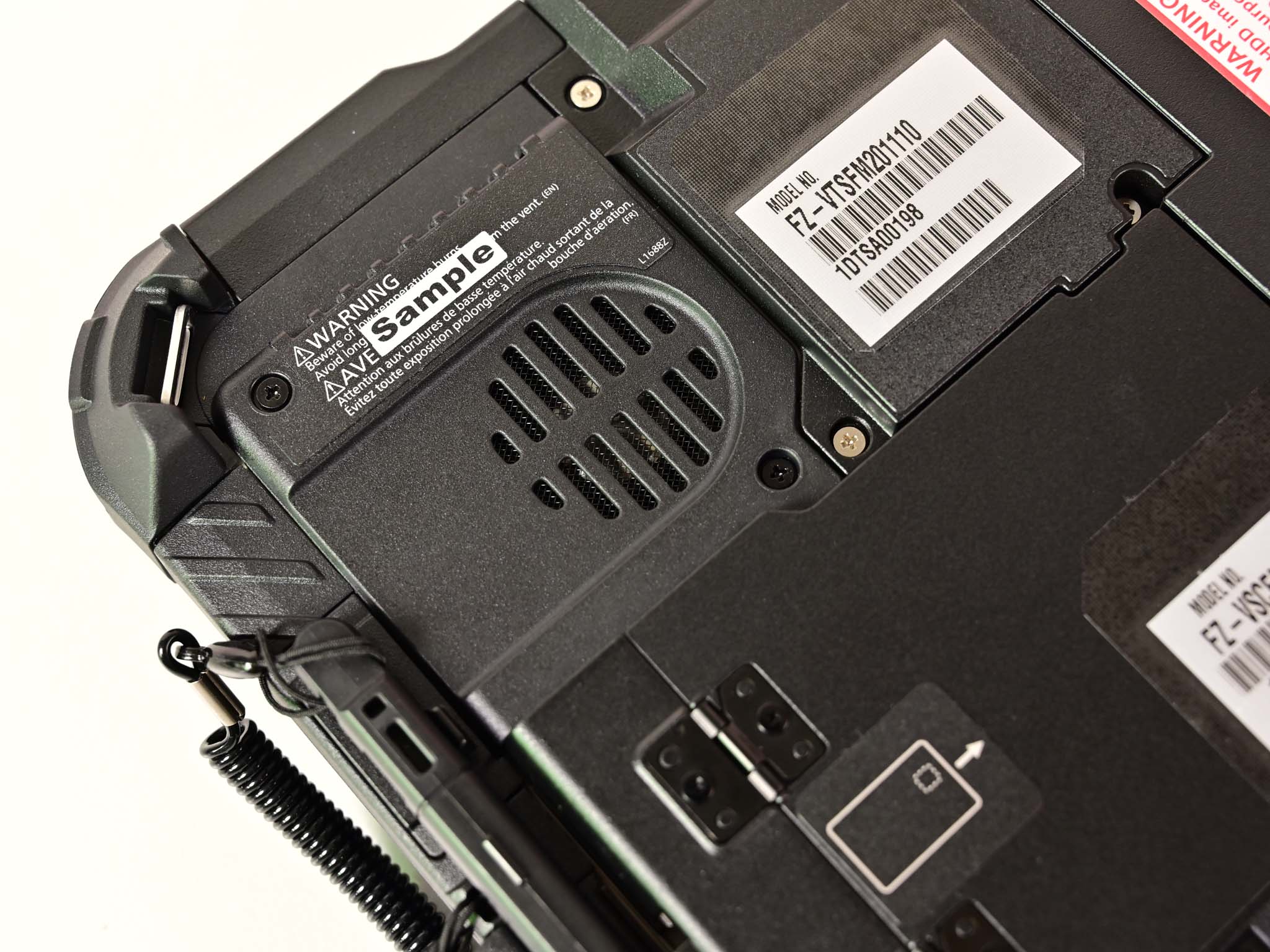
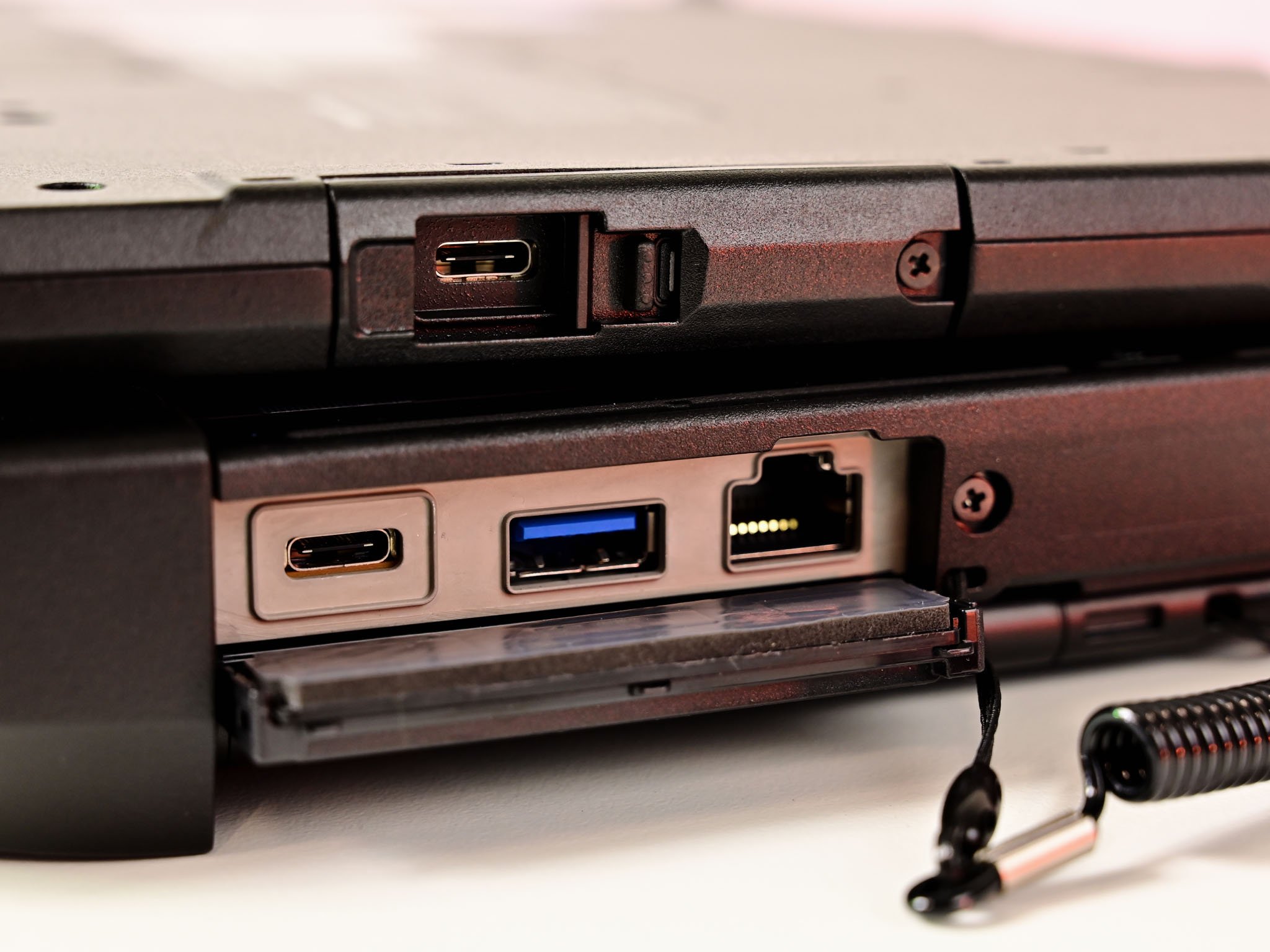
While modular PCs aren't new (Lenovo was very good at them about 20 years ago), Panasonic is the only one embracing the concept in 2021. The reasons are apparent, as it gives customers much more flexibility when buying a $3,000 tablet to keep it functional. Moreover, you may notice the Panasonic Toughbook G2 is not exactly pretty because it doesn't need to be for its job. It's like a combo steampunk/cyberpunk fever dream that merges old concepts with new technology.
Panasonic is currently celebrating the 25th anniversary of its Toughbook line of PCs, and it is leaning harder than ever into the series. It's almost utterly dominant in this space now and for a good reason, as the Toughbook G2 demonstrates. Let's just hope it can fix its trackpads in the next round of rugged beasts.

Daniel Rubino is the Editor-in-Chief of Windows Central. He is also the head reviewer, podcast co-host, and lead analyst. He has been covering Microsoft since 2007, when this site was called WMExperts (and later Windows Phone Central). His interests include Windows, laptops, next-gen computing, and wearable tech. He has reviewed laptops for over 10 years and is particularly fond of Qualcomm processors, new form factors, and thin-and-light PCs. Before all this tech stuff, he worked on a Ph.D. in linguistics studying brain and syntax, performed polysomnographs in NYC, and was a motion-picture operator for 17 years.
